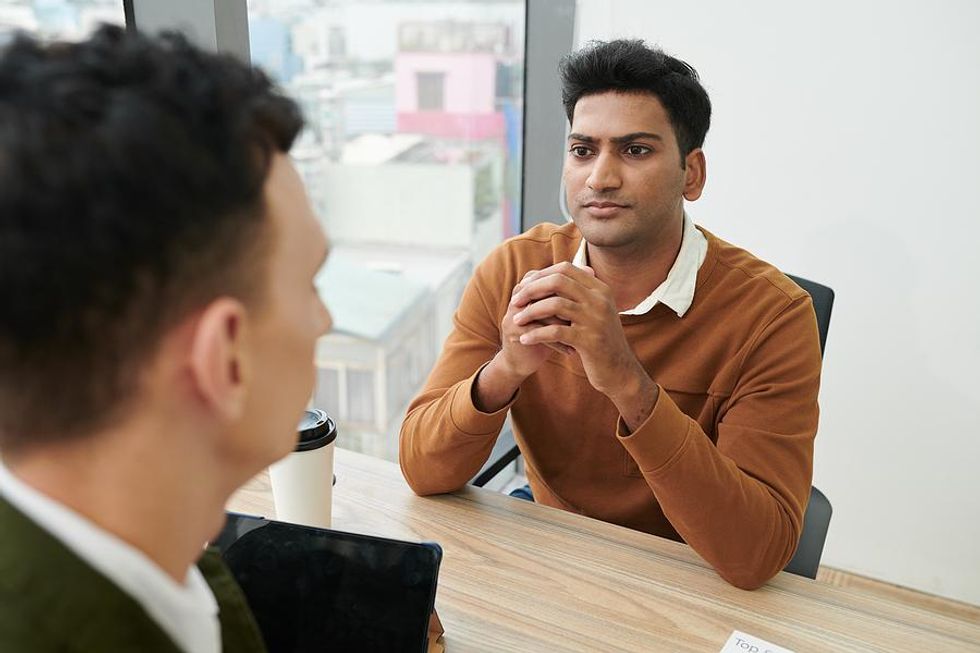
If you are going to an interview, there are a few key things you will want to consider. Many people think that knowing how to accurately answer questions is the only thing that needs to be practiced. In reality, you also need to master your nonverbal communication to demonstrate your best attributes to the interviewer.
Nonverbal communication is one of the most important aspects of an interview. This includes factors such as your gestures, body language, facial expressions, and more. These communication signals are important because they send a multitude of messages to the interviewer. Many times, nonverbal communication is subconscious, but it is still something that people will notice. Just as you will control what you verbally say, you will want to control what you communicate nonverbally too.
It is a good idea to have your verbal communication match your nonverbal communication. This means if you say you are confident that you can give the business what it needs because you have years of experience, you do not want to come off as timid, shy, and unsure of yourself. Instead, you want to exude confidence.
Here are a few tips to improve your nonverbal communication in your next interview.
Get Plenty Of Practice
One of the best things you can do is to practice your interview ahead of time. You can do this by yourself, though you will want to have a mirror or video recording so you can evaluate your communication signals, or with a friend via a mock interview.
When practicing for a job interview, you should be conscious of what you appear to be saying nonverbally and think about how you can change it to give the impression you are looking for. Pay attention to your posture—sitting up straight conveys confidence, while slouching can make you seem disengaged. Maintain steady eye contact to show attentiveness, but be careful not to stare, as that can come off as intimidating or just plain weird and unsettling.
Also, nervous habits like fidgeting, crossing your arms, or avoiding eye contact, can send unintended messages. Instead, use purposeful gestures to reinforce your words and exhibit enthusiasm.
Practicing these small adjustments can make a big difference in how you're perceived during an interview.
Be Mindful During Your Interview

Bigstock
You should be aware of how you are communicating during the interview, but be sure not to overthink and become distracted from the interview questions. For example, if you want to demonstrate confidence, then you need to think about having excellent posture, keeping eye contact with your interviewer, and making sure to keep a calm demeanor. Additionally, avoid fidgeting, as it can make you appear nervous or uncertain.
Subtle gestures, like nodding occasionally to show engagement, can help convey active listening. Also, remember to match your facial expressions to the conversation; smiling appropriately can make you seem approachable and enthusiastic.
By being mindful of these nonverbal cues, you can reinforce the message that you are a confident and capable candidate.
Be Aware Of Your Hands

Bigstock
A big issue many people face when they are in an interview is that they do not know what to do with their hands. Individuals should avoid fidgeting and touching their hair and face because the interviewer can read these communication signals negatively. These nervous movements and fidgets may be a sign of anything from uncertainty in your qualifications to lying about something.
It is also important to give the interviewer an open body position without crossing your arms, which shows that you are comfortable and open to discussion. By crossing your arms, you are sending the message that you are closed off, which makes an interviewer think you may have something to hide or feel negatively about the interview.
You can keep your arms at your side or on your lap. Using your hands when you explain something is fine as well, and it is seen as a very open gesture to show your palms to the other individual while explaining.
Pay Attention To The Interviewer's Nonverbal Communication

Bigstock
While thinking about the right thing to say both verbally and nonverbally, you need to think about the message you are getting from the interviewer. For instance, if you see them lean back or look uncomfortable, you may be in their personal space.
Pay attention to their facial expressions and body language—are they nodding along in agreement, or do they look distracted? If they seem disengaged, it may be a sign to adjust your tone, pick up the pace, or bring more enthusiasm into your responses. Likewise, mirroring their energy and maintaining good eye contact can help build rapport and create a positive, comfortable, and memorable interaction.
Small adjustments in your delivery can make a huge difference in how your message is received.
Improving your nonverbal communication can boost your confidence, help you build rapport with interviewers, and ensure that your message aligns with your words. Small adjustments—like maintaining eye contact, using open body language, and controlling nervous gestures—can make a significant impact on how you're perceived.
Remember, practice makes perfect, so consider mock interviews or recording yourself to refine your nonverbal cues. Mastering these skills can give you a competitive edge and help you leave a lasting positive impression.
Need more help with your career?
Get access to our Free Resource Center today (no credit card required!).- 5 Red Flags Employers Watch For In Job Interviews ›
- What's Your Workplace Communication Style? ›
- 3 Ways To Stay Confident During Job Interviews - Work It Daily ›
- What Are Non-Verbal Communication Skills? - Work It Daily ›
- What Your Interview Body Language Reveals About You - Work It Daily ›

 Bigstock
Bigstock Bigstock
Bigstock Bigstock
Bigstock


